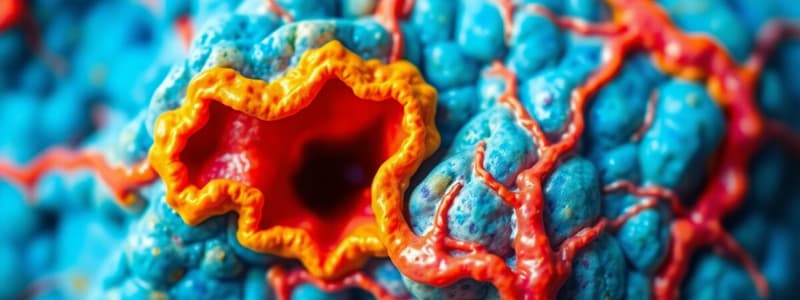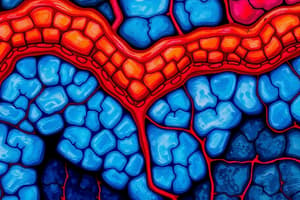Podcast
Questions and Answers
What are the special characteristics of epithelial tissue?
What are the special characteristics of epithelial tissue?
Closely packed cells, cell contacts, polarity, innervated but avascular, regeneration.
What are the main types of connective tissue?
What are the main types of connective tissue?
Loose connective tissue, dense connective tissue (regular and irregular), adipose, reticular.
Name the three types of muscle tissue.
Name the three types of muscle tissue.
Skeletal muscle, cardiac muscle, smooth muscle.
What is the function of bone in connective tissue?
What is the function of bone in connective tissue?
What are the components of liquid connective tissue?
What are the components of liquid connective tissue?
What types of cartilage exist and where are they found?
What types of cartilage exist and where are they found?
What are the main functions of nervous tissue?
What are the main functions of nervous tissue?
Flashcards are hidden until you start studying
Study Notes
Epithelial Tissue
- Closely packed cells
- Strong cell junctions
- Polarity - apical (free) and basal surfaces
- Innervated: receives nerve signals
- Avascular: lacks blood vessels
- High regenerative capacity
Connective Tissue
- Loose connective tissue: Contains fibers and cells in a gel-like matrix, surrounds organs and blood vessels
- Dense Connective Tissue: Packed with collagen fibers, supports and protects
- Regular: Fibers arranged in parallel, forms tendons and ligaments
- Irregular: Fibers arranged in random directions, forms dermis of the skin
- Adipose: Stores fat, provides insulation and cushioning
- Reticular: Forms the framework of the lymph nodes and spleen, supports blood-forming cells
Muscle Tissue
- Skeletal Muscle: Attached to bones, responsible for voluntary movement
- Cardiac Muscle: Found in the heart, responsible for involuntary rhythmic contractions
- Smooth Muscle: Found in walls of hollow organs, responsible for involuntary contractions
Bone
- Hard connective tissue due to collagen fibers and calcium salts in the extracellular matrix
- Provides support and protection for body structures
Liquid Connective Tissue
- Blood: Consists of blood cells (red blood cells, white blood cells, platelets) suspended in plasma
- Lymph: Fluid circulating in lymphatic vessels, involved in immune response
Cartilage
- Hyaline Cartilage: Found in the nose, trachea, and articular surfaces of bones, provides flexibility and support
- Elastic Cartilage: Found in the ear and epiglottis, allows for bending and returning to original shape
- Fibrocartilage: Found in intervertebral discs and menisci, provides support and shock absorption
Nervous Tissue
- Composed of neurons and supporting cells (neuroglia)
- Transmits signals throughout the body
- Responsible for communication, sensation, and control of bodily functions
Studying That Suits You
Use AI to generate personalized quizzes and flashcards to suit your learning preferences.



